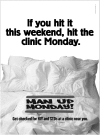"Real men don't": constructions of masculinity and inadvertent harm in public health interventions
- PMID: 24825202
- PMCID: PMC4062033
- DOI: 10.2105/AJPH.2013.301820
"Real men don't": constructions of masculinity and inadvertent harm in public health interventions
Abstract
Research shows that constraining aspects of male gender norms negatively influence both women's and men's health. Messaging that draws on norms of masculinity in health programming has been shown to improve both women's and men's health, but some types of public health messaging (e.g., Man Up Monday, a media campaign to prevent the spread of sexually transmitted infections) can reify harmful aspects of hegemonic masculinity that programs are working to change. We critically assess the deployment of hegemonic male norms in the Man Up Monday campaign. We draw on ethical paradigms in public health to challenge programs that reinforce harmful aspects of gender norms and suggest the use of gender-transformative interventions that challenge constraining masculine norms and have been shown to have a positive effect on health behaviors.
Figures
Comment in
-
Fleming et al. respond.Am J Public Health. 2014 Oct;104(10):e1-2. doi: 10.2105/AJPH.2014.302128. Epub 2014 Aug 14. Am J Public Health. 2014. PMID: 25122016 Free PMC article. No abstract available.
-
On the value of the "Man Up Monday" campaign.Am J Public Health. 2014 Oct;104(10):e1. doi: 10.2105/AJPH.2014.302107. Epub 2014 Aug 14. Am J Public Health. 2014. PMID: 25122023 Free PMC article. No abstract available.
References
-
- 2012 PHEHP public health education materials contest award winners. Public Health Education and Health Promotion Newsletter. Fall 2012 Available at: http://www.apha.org/NR/rdonlyres/F895A66A-2919-4EDF-AC6F-B8384539EA6F/0/.... Accessed March 10, 2014.
-
- National Prevention Information Network. New Man Up Monday Campaign doubles STD testing of young men in Virginia trial by Planned Parenthood. 2012 Available at: http://www.cdcnpin.org/scripts/display/NewsDisplay.asp?NewsNbr=60626. Accessed May 20, 2013.
-
- Fry J, Neff R. Healthy Monday: Two Literature Reviews. Center for a Livable Future. Baltimore, MD: Johns Hopkins University Press; 2010.
MeSH terms
Grants and funding
LinkOut - more resources
Full Text Sources
Other Literature Sources



